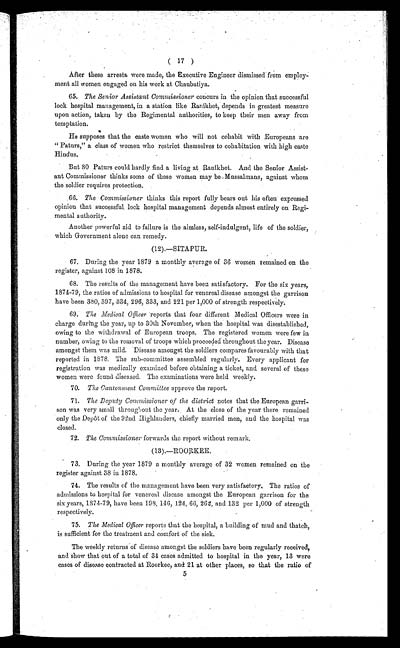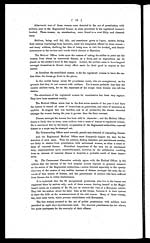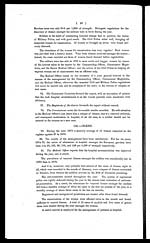Medicine - Institutions > Lock hospitals > Annual report on the working of the lock hospitals in the North-Western Provinces and Oudh > Sixth annual report of the working of the lock hospitals in the North-Western Provinces and Oudh, for the year 1879
(207) Page 17
Download files
Individual page:
Thumbnail gallery: Grid view | List view

( 17 )
After these arrests were made, the Executive Engineer dismissed from employ-
ment all women engaged on his work at Chaubatiya.
65. The Senior Assistant Commissioner concurs in the opinion that successful
lock hospital management, in a station like Ranikhet, depends in greatest measure
upon action, taken by the Regimental authorities, to keep their men away from
temptation.
He supposes that the caste women who will not cohabit with Europeans are
" Paturs," a class of women who restrict themselves to cohabitation with high caste
Hindus.
But 80 Paturs could hardly find a living at Raníkhet. And the Senior Assist-
ant Commissioner thinks some of these women may be Mussalmans, against whom
the soldier requires protection.
66. The Commissioner thinks this report fully bears out his often expressed
opinion that successful lock hospital management depends almost entirely on Regi-
mental authority.
Another powerful aid to failure is the aimless, self-indulgent, life of the soldier,
which Government alone can remedy.
(12).—SITAPUR.
67. During the year 1879 a monthly average of 36 women remained on the
register, against 108 in 1878.
68. The results of the management have been satisfactory. For the six years,
1874-79, the ratios of admissions to hospital for venereal disease amongst the garrison
have been 380, 397, 334, 296, 333, and 221 per 1,000 of strength respectively.
69. The Medical Officer reports that four different Medical Officers were in
charge during the year, up to 30th November, when the hospital was disestablished,
owing to the withdrawal of European troops. The registered women were few in
number, owing to the removal of troops which proceeded throughout the year. Disease
amongst them was mild. Disease amongst the soldiers compares favourably with that
reported in 1878. The sub-committee assembled regularly. Every applicant for
registration was medically examined before obtaining a ticket, and several of these
women were found diseased. The examinations were held weekly.
70. The Cantonment Committee approve the report.
71. The Deputy Commissioner of the district notes that the European garri-
son was very small throughout the year. At the close of the year there remained
only the Depôt of the 92nd Highlanders, chiefly married men, and the hospital was
closed.
72. The Commissioner forwards the report without remark.
( 13 ).—ROORKEE.
73. During the year 1879 a monthly average of 32 women remained on the
register against 38 in 1878.
74. The results of the management have been very satisfactory. The ratios of
admissions to hospital for venereal disease amongst the European garrison for the
six years, 1874-79, have been 198, 146, 124, 66, 262, and 132 per 1,000 of strength
respectively.
75. The Medical Officer reports that the hospital, a building of mud and thatch,
is sufficient for the treatment and comfort of the sick.
The weekly returns of disease amongst the soldiers have been regularly received,
and show that out of a total of 34 cases admitted to hospital in the year, 13 were
cases of disease contracted at Roorkee, and 21 at other places, so that the ratio of
5
Set display mode to: Large image | Zoom image | Transcription
Images and transcriptions on this page, including medium image downloads, may be used under the Creative Commons Attribution 4.0 International Licence unless otherwise stated. ![]()
| Permanent URL | https://digital.nls.uk/75111453 |
|---|




